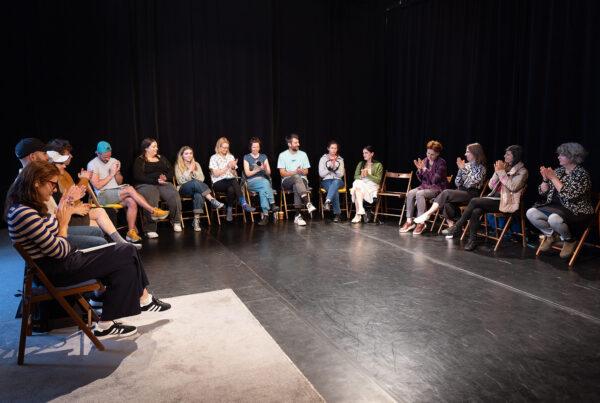by Arno Kleinofen
“We—all of us on Terra—live in disturbing times, mixed-up times, troubling and turbid times. The task is to become capable, with each other in all of our bumptious kinds, of response.“ (Donna Haraway).
The educational mission (so massively influencing German theater art) failed, the rebellion of the young generation has left theaters and schools, is on the streets again (at Fridays for Future; with the glamour of a rebelling youth), or giving themselves over to GRYME rhythms and words, witnessing the overall brainfuck experience of a broken world, broken neighborhood, scattered families. Those very young Gryme artists are rapping in a speedy furor an apparently suicidal monologue. There is a new dimension of rigorousness in a new youth movement, claiming: Future Now, (not Paradise Now, as we once demanded) but “Give us a Future”. They invented, as during French Revolution times, a new time measurement, cut out a Friday of our calendars of everyday life. That is how they got our attention, “shooting” at OUR clocks: those dulling high frequency flickering with omnipresent capitalism. Climate change now! They were and still are ridiculed, their pouvoir neglected because of their lacking expertise, because of their youth. Cut! Now we, the old are floating in our own masque of a fake, everlasting youth. Like in the movie Brazil one can see the clips and needles we used to tighten our facial skin with. Now we are running around like the disfigured face of a mother in David Foster Wallace´s short story “Oblivion”, looking like a “Scream” masque – We are old again, like really old, our time is “out of joint”.
Yes, we are being accused. We, working in the art of theater for young people, should actually be specialists in handling time, always seeking for that unique moment in time, this “Faustian” moment of “Verweile doch, Du bist so schön” (please stay, you are so beautiful)– we, who did consider time to be our raw material, we used to throw on the commodity markets; we, who were the specialists and discoverers of the attention economies of our children and youth.
Not only have the advanced techniques of imaging we are confronted with reached a different scale of what we think we know and can handle. Images, this raw material of imagination and world view, the images we project all over, we have replaced them by replications, three dimensional, retouched, for ever present and everlasting.
We can no longer stick to our art as “(…) stand in, as proxy, which pretends that everything is still OK , while the people (the children, note f. the author) are reeling from the effects of shock policies, shock and awe campaigns, reality TV, power cuts, any other form of cuts, cat GIF´s, tear gas (…), completely dismantling and rewiring our sensory apparatus (…)” (Hito Steyerl, Art in the Age of Planetary War).
No wonder, Jetse Batelaan does a play called: “The story of a story”, or “The show, where hopefully nothing happens”, starting from scratch, from the backside of the medal of theater, the boring side, he dares to open to audience and actors.
We are the accused. They are pointing at us, the older generation, pointing at us on behalf of the wet Mediterranean grave, the concentration camps we built (once again) at borders, the inversion of principles of justice, human rights, empathy and care for human mankind. Accused of “transferring” the wretched onto the screens, into some sort of never ending casting show, accused of judging our children by countless juries, preparing them on behalf of better profit in a consumer society.
Yes, we thought big and took big steps. Now we tend to be humiliated and insulted. We ran into disaster, we ran short, and created even more paradoxes and predicaments and dead endings.
We have to confess: We soothed ourselves (and still do), we wiggled ourselves in the cradle of a good ecologic conscious, a gender tolerant conscious, a political correct conscious, a just ecological footprint conscious: we multiply conscious like on an assembly line. And we placed ourselves at a comfortable distance to our own practices, creating new prejudices and intolerance, not able to withstand present ambiguities.
How can we answer this accusation?
Maybe it would be a good idea to propose something like a “Speak Bitterness” (Forced Entertainment) – confessions session to all colleagues working in TYA. It would be a durational meeting, we would put lists (anonymous) on the table, the lists of all that went wrong, while working with children and youth. To give a true insight in our very own understanding of what it means to artistically work for and with children; to reveal our own sometimes small scale ambitions behind the sometimes blown up dialogs and discourses we have been arranging on behalf of our kids, but certainly also in self-defending…
Maybe we should reveal to us the lists of projects and productions we have never realized, the “unborn” ones, our favorite ones, those we had to “kill” – maybe we should follow the fragile and small capillars, those rhizoms of intentions, ideas, half-articulated fantasies – recapitulate the objections we developed against them, and how come we always tend to propose some ethical fast food cook books on stage.
A daring and risky list: Maybe it would reveal an essential question, like Jetse Batelaan dared to ask: “Are we really such precious creatures?”, asked with an essential curiosity for the unknown potential of a human being.
(in: Hester van Hasselt: Jetse Batelaan, The Book that almost wasn´t written)
Director and dramaturg, Arno Kleinofen is co-founder of Teatro 4Garoupas. T4G presents a concept for young audiences that does not make any concessions on well-known formulas of the TYA conventions



